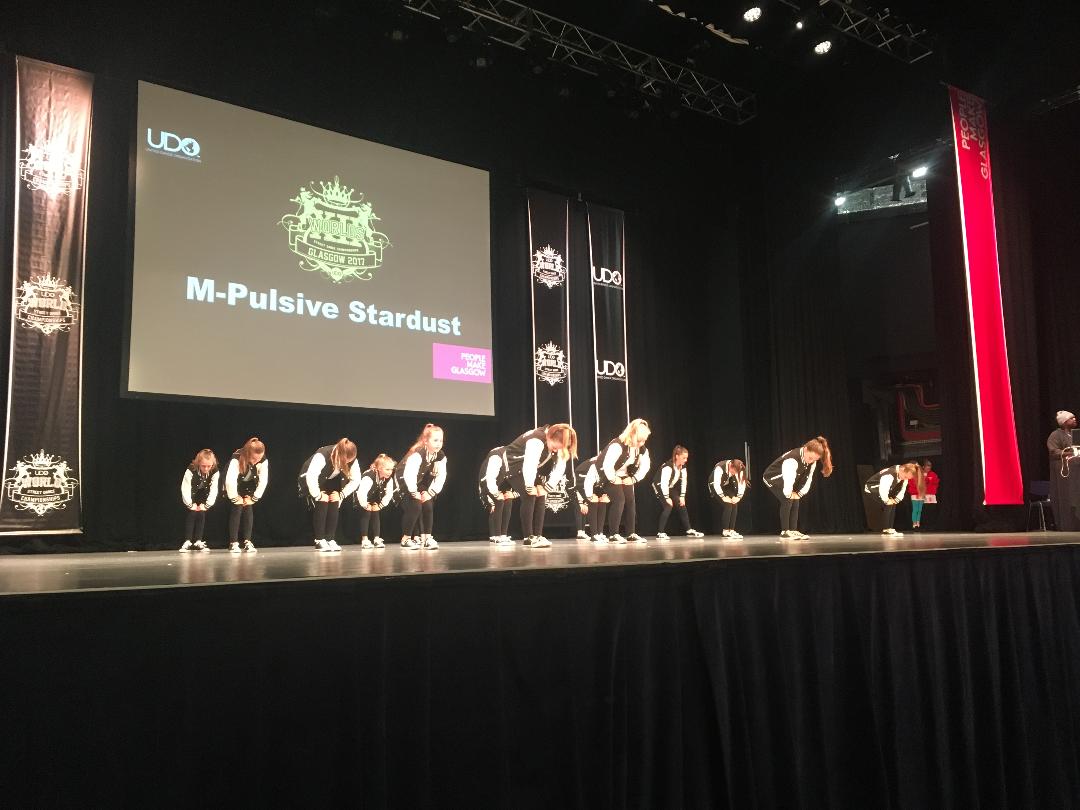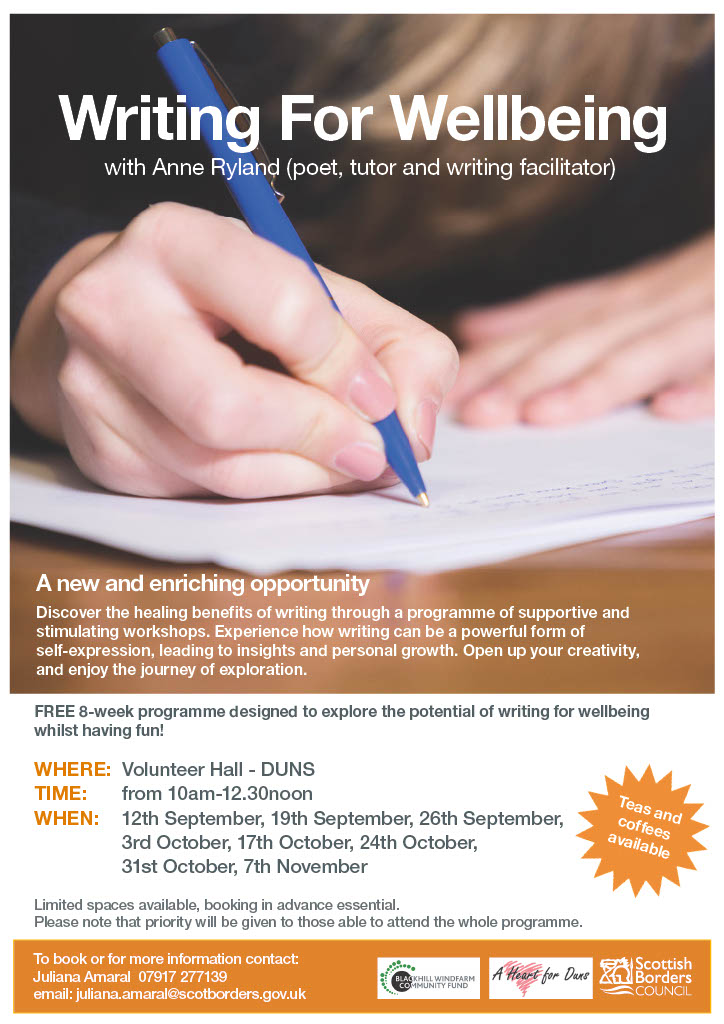Duns Writing for Wellbeing Programme Partners: Community Capacity Building Team (Juliana Amaral), A Heart for Duns and Anne Ryland.
Funders: Blackhill Windfarm Community Fund and Christies Trust.
The Writing for Wellbeing programme started as a pilot in September 2017 as a response to an identified gap in the community. This new programme of eight writing workshops was a collaborative project between A Heart for Duns, SBC Community Capacity Building Team and Anne Ryland, a local poet and writing facilitator. We are most grateful to The Blackhill Windfarm Community Fund and The Christie Trust for funding the project.
The programme offered an opportunity for participants to discover the healing potential of creative writing. Through a series of supportive and informal workshops, participants had the chance to explore the ways in which writing can be used as a powerful tool for self-expression and personal growth. The main aim was that participants would experience the absorbing and calming effect of the writing process. The workshops were designed to be fun, but also to provide enrichment and intellectual stimulation. Outline of the Programme The first session was devoted to the creation of a group poem, and guidance was offered on keeping a personal journal between sessions. Each subsequent session focused on a theme tailored to the group’s needs and interests (for example Simple Pleasures, Precious Objects, Home and Borders). Participants were encouraged to experiment with different forms, such as poetry, memoirs, letters and prayers, and attention was also given to drafting, shaping and editing. The programme culminated in the production of a booklet aimed to celebrate participants’ writing. Each workshop consisted of reading and discussing a short text; writing exercises where the facilitator provided prompts or stimuli as a ‘way in’ to writing; a period of quiet individual writing; and optional sharing of writing. Sessions unfolded at a pace that allowed time for reflection and insight. Recording and appreciating what was positive and meaningful in the present moment helped to nurture an awareness of the senses.
Who was the programme for? The Writing for Wellbeing programme was not intended as a therapy group, therapy substitute or a course of treatment, and was therefore not a replacement of services for those who require ongoing support from qualified healthcare practitioners. However, growing research-based evidence illustrates the potential for writing to improve wellbeing. Since the 1980s, at least 300 studies have been published which demonstrate that creative and expressive writing results in benefits to physical and emotional health.
We were particularly keen to reach people suffering from isolation, whether due to physical or emotional ill health, loss or bereavement, or purely geographical factors, or those people who were simply keen to embark on a journey of discovery. Our main intention was that the Writing for Wellbeing programme would build cumulatively, allowing trust and confidence to grow, while facilitating deeper exploration. It was hoped that participants would continue writing between sessions bearing in mind that wellbeing, a gradual process, is more likely to develop in an ongoing group where people feel a sense of belonging.
Evaluating the programme 12 people signed up for the programme and others interested were put on a waiting list. On the first session, the group responded to a questionnaire created to gather individuals’ expectations of the programme and what prompted them to take part. Participants’ responses were as follows: “New stimuli in a supportive group, reduce isolation and forge possible friendships” “A way into my creativity but companionship along the way and stimulation” “To feel good about oneself” “To be able to recall details of events that I might otherwise forget” “By listening and meeting with other people, become active again in putting down my feelings” “To gain more experience in editing and drafting my writing” “To gain an insight into myself in terms of wellbeing” “Would like to have more of a creative flow in my writing. Writing helps me to relax which releases tension associated to thoughts. Being able to express my thoughts externally gives me inner peace” “Allows me to move past negativity within my mind, so, bring balance to body, mind and soul” “Sense of achievement, being challenged” “More self-awareness and focus. Greater sense of purpose and confidence” “I hope to open my mind to new possibilities, explore my innate creativity, and see what happens and enjoy the journey.” “I hope to explore my creative side and find an avenue for self-expression”
For the second session, The Warwick-Edinburgh Mental Well-Being Scale and the Loneliness and Isolation questionnaires were introduced. The aim was to measure individuals’ well-being and feeling of loneliness on the onset, in order to compare with their subjective experiences at the end of the programme. However, only half of the participants completed the questionnaire as the other half of the group felt uncomfortable not only with the format of the scale but also with the nature of the questions. This shows how people feel uncomfortable when reflecting about their feelings, especially when it comes to loneliness and isolation. One participant responded marked “rarely” to the affirmation “I’ve been able to make up my own mind about things”, another also marked “rarely” to the affirmation “I’ve been feeling optimistic about the future” and “I’ve been feeling close to other people”. Affirmations such as “I am content with my friendships and relationships”, “I have enough people I feel comfortable asking for help at any time” and “My relationships are as satisfying as I would want them to be” were also marked as disagree or strongly disagree especially by male participants. In using the “leave us a comment” space on the questionnaire, one participant wrote: “I moved to Longformacus at the end of last year. I have been looking at ways to be more involved in the local community whilst doing activities that supports well-being and get me out of the house as I am not working at the moment, I have taken some time off the workplace to help me manage my well-being”
Since half of the group did not feel comfortable in answering the questionnaire, we decided that other measures to evaluate the activity and its impact on individuals’ life could be adopted so the questionnaires were not used. Nevertheless, the situation served as an indication and gave us insight on how difficult it can be for people to reflect upon and express their feelings, especially when it comes to negative experiences. In terms of what went well during the programme, one of the most significant measures was retention of participants.
Twelve people signed up for the activity and 11 concluded the full programme. One male participant decided that the activity was not what he expected despite receiving an outline of the programme prior to signing up, as he hoped to explore more in terms of writing non-fiction and less in terms of emotions and subjective feelings. This can be explained as men tend to find it more difficult to express emotions than women. A 2014 study conducted by neuropsychologist Dr. David Lewis and released by Royal Mail showed that “men feel emotion just as much as women, sometimes more strongly, but are less willing to express these emotions openly due to expectations put on them by society.
End of the programme feedback All participants commented on the positive impact the programme had on their well-being. Some people reported an increased feeling of belonging and connection as per quotes below: “Emotionally I feel happier and look forward to coming each week. I feel happier when writing, focused, centred and I feel connected to myself and the environment. I have enjoyed being part of a small community and meeting new people” “This programme has benefitted me emotionally. Using the frameworks and prompts enabled me to reach and write about areas of my life I have avoided. Intellectually, I have been able to unlock a more imaginative style in writing” “I have benefitted greatly in having such a course, specifically about expressing creativity. I have discovered an aspect of myself that has been latent for decades” “I just want to say a huge thank you to Anne and Juliana for bringing this programme together” “ I did not know what to expect but have enjoyed this course immensely” “Writing poetry was never something I considered doing but I have found it amazingly therapeutic. I have enjoyed the self-discovery of talents I didn’t know I had” “I have surfaced some deep personal pain through some of the writing exercises. This is helping me to leave things behind and focus more on my personal needs. The positive focus on ‘Things I am Grateful for’ is particular helpful” “I came into the programme to experience intellectual stimulation and I can honestly say I have been challenged. I think I have risen to the challenge so have experienced a sense of accomplishment” “Each session went very quickly but was well-balanced, 8 weeks just enough to experience a sense of development without losing interest” “Working with a group and being with people helps loneliness; the biggest factor in elderly people’s lives” “I have benefited from this programme socially by meeting an unknown group of people and intellectually by using different thought processes and attempting new skills” “I discovered an ability to write fiction. I have written contemplative pieces but no fiction since I left school in 1959. I enjoy using my imagination which is a completely new direction”
Case Studies The programme was successful in attracting people from disparate backgrounds and skills which helped reduce intellectual and even, social inequalities. In addition, it provided intergenerational experience where participants of different ages could benefit through skills sharing; it fostered a sense of shared endeavour in the creative work and promoted social interaction and a sense of belonging. Ultimately, the programme enabled people to identify natural networks of support and feel more connected in the community. As a result, the group decided to meet at the local library on a regular basis, as a monthly social activity to share ideas, invite guest speakers and write poetry and prose. Another outcome is the creation of a booklet, a collection of written pieces collated and designed by the participants (see attachment). A joint endeavour which not only helped to strengthen the group’s connection but it also developed their writing through team work and skills sharing. When asked what part of the programme was most enjoyable, one participant replied “Putting together two finished pieces of writing – taking a piece from idea to completion”. Some participants are now looking into ways to improve and strengthen their abilities further, with a view to publish materials in the future.



